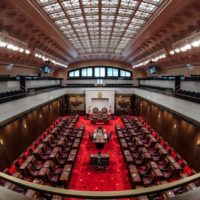Senate Renewal
Renewed Senate’s track record reason for ‘genuine optimism,’ says Senator Harder
“There is plainly no public appetite for a partisan echo chamber,” Senator Peter Harder wrote in a discussion paper that was recently republished in the National Journal of Constitutional Law.
The renewed Senate has acted neither as a rubber stamp for the Government nor as a rival to the people’s elected representatives – complementing the House of Commons better than before, the Government Representative in the Senate argued in a discussion paper published in a Canadian law journal.
The discussion paper by Senator Peter Harder, which was originally published in April 2018, was updated for republication in the National Journal of Constitutional Law.
“Those who would reverse the reform that has achieved this result should give their position sober second thought,” he wrote.
“Excessive partisanship and top-down control by the executive has too often hampered the appropriate discharge of the Senate’s constitutional duties, undermining its credibility. Recent history teaches us that the appointment to the Senate of party loyalists, with an excessive focus on party fundraising, partisan messaging and the electoral consequences of their legislative work, has been harmful to the Senate’s standing with the public.”
The current Government created an independent advisory board to make recommendations on Senate appointments. So far, 49 independent Senators have been appointed under the new system, while many more have left partisan caucuses in favour of independence.
“There is plainly no public appetite for a partisan echo chamber,” Sen. Harder wrote.
Complementarity
Sen. Harder suggested that it is possible for the Senate to be redeemed in Canadians’ eyes if it embraces the qualities that distinguish it from the House of Commons.
“It is true that Senators intent on closing the credibility gap of the institution have a colossal task on their hands. But if the public comes to see that the Senate is their ally in Parliament, the credibility gap will close. Thankfully, progress is actually taking place in the Senate at a quick pace.”
He noted that the Government has accepted Senate changes to more than a quarter of bills, including improvements to legislation on medical assistance in dying, on the legalization of cannabis and on removing barriers to Canadian citizenship. Furthermore, the Senate has not defeated any bills approved by the House of Commons. Where disagreements have occurred between the two chambers, the Senate has deferred to the will of elected members of Parliament, consistent with its intended constitutional role.
“The track record of the Senate three years into the new model provides reason for genuine optimism about the future of the institution as a less partisan and more independent body,” he wrote.
“The Senate’s unique quality lies in its reviewing capacity. Justifiably, the Senate has always viewed defeating Government legislation as a last resort, an extraordinary action that should be reserved for the most egregious of circumstances. Senators know that the misguided use of their veto powers would have disastrous consequences for the institution.”




















































